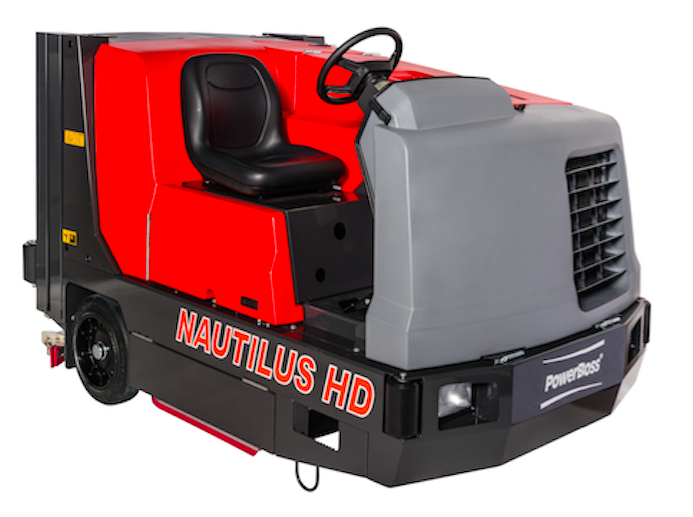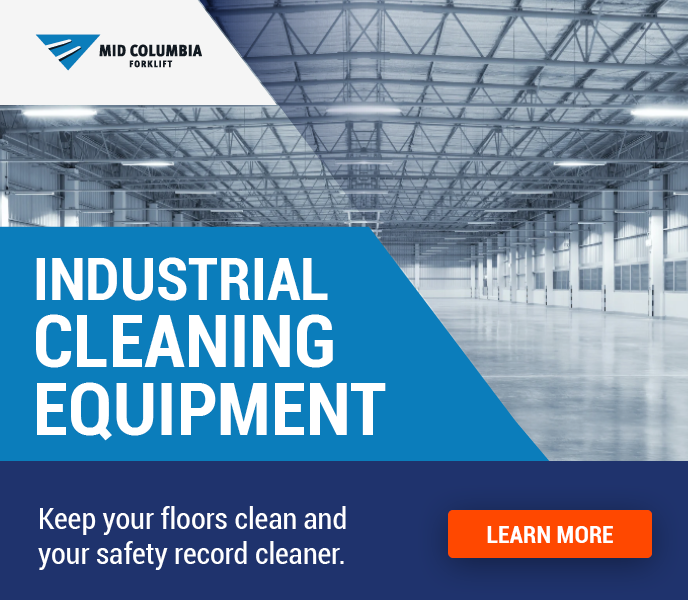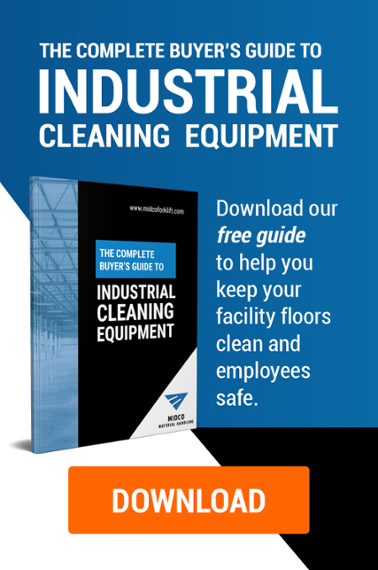Choose the Best Industrial Floor Scrubber for Your Operation
by Dan Elliott, on November 4, 2022 at 9:52 AM
.png?width=686&height=386&name=Choose%20the%20Best%20Industrial%20Floor%20Scrubber%20(2).png) Your bedroom isn’t going to clean itself. If you were anything like most kids, you probably heard that more than once growing up. Cleaning isn’t a task many people relish. But it’s critical to protecting your health and safety at home and in your warehouse.
Your bedroom isn’t going to clean itself. If you were anything like most kids, you probably heard that more than once growing up. Cleaning isn’t a task many people relish. But it’s critical to protecting your health and safety at home and in your warehouse.
But unlike your home, there are better ways to clean your facility than a mop and a bucket of bleach. Industrial floor scrubbers get your floors cleaner than the old-fashioned methods. And they save hundreds of work hours. Read more to learn how to find the right industrial floor scrubber for your operation.
Why Machine Labor Instead of Manual
Industrial floor scrubbers outperform the traditional bucket and mop in every category. Below are the top 3 reasons why floor scrubbers are the best choice for your facility.
1. Safety
You might not consider mop and bucket a significant safety hazard. But slips, trips, and falls are responsible for over 100,000 workplace injuries and over 100 deaths each year. And the average worker injured by a fall will be out of work for 12 days. As a result, falls from slipping are one of the most common worker’s compensation claims.
Falls due to slipping or tripping are the 3rd most preventable cause of injury in the workplace. And a clean, dry floor goes a long way toward preventing them in your warehouse. Mops slosh water and detergent everywhere, leaving slick flooring in their wake. That wet floor is an accident waiting to happen, even with proper signage.
Plus, each dip of the mop deposits more bacteria and grime into the bucket. This quickly overwhelms the already diluted cleaning solution. And after only a few passes, the water turns into a putrid sludge of bacteria. Then the mop spreads that slurry across every floor in your facility. The result is a biological nightmare that threatens the health of your staff.
Only industrial floor scrubbers can ensure a clean, dry floor in your facility. The water-saving design and large water tanks of modern industrial floor scrubbers ensure that cleaning uses only fresh water. This removes the risk of spreading contamination. Additionally, efficient squeegee systems ensure that all cleaning water gets collected, leaving only dry flooring behind.
2. Cost
Manual cleaning requires manual labor. On average, a worker can mop 4,000 - 5,000 square feet of flooring each hour. An employee with a walk-behind floor scrubber cleans about 13,000 square feet in that same time. And a ride-on floor scrubber cleans over 100,000 square feet of flooring in that hour. That makes floor scrubbers 20 times more efficient than a mop and bucket. That level of efficiency means you could cut cleaning labor costs by up to 80%.
3. Green Cleaning
Mops waste a lot of water with each sodden pass. By comparison, industrial floor scrubbers use very little water. And water retention technology ensures that nearly zero water is wasted during cleaning.
Additionally, many environments may not need cleaning chemicals at all. Some can be cleaned with just water and scrubber pads. Steam is also an effective cleaning agent that kills 99.9% of pathogens. And when chemicals are required, modern floor scrubbers allow the operator to control the dilution to use only what is needed.
Know Your Cleaning Needs
 There are innumerable options for industrial floor scrubbers on the market. The good news is that whatever your needs, there is a model to meet them. The bad news is that you’ll want to know your needs before investing. Below are the key things you’ll want to consider when selecting the right floor scrubber for your facility.
There are innumerable options for industrial floor scrubbers on the market. The good news is that whatever your needs, there is a model to meet them. The bad news is that you’ll want to know your needs before investing. Below are the key things you’ll want to consider when selecting the right floor scrubber for your facility.
- Types of debris. Are you planning to clean up food spills or metal shavings? Knowing what type of debris the floor scrubber needs to handle will help you choose between disc scrubbers and cylindrical brushes.
- Size of the cleaning area. How many square feet need to be cleaned daily? This is one of the factors that will help you choose between a walk-behind floor scrubber, a ride-on floor scrubber, or an autonomous floor scrubber.
- Narrow spaces. Does your facility have lots of narrow spaces like tight aisles? Walk-behind floor scrubbers are small enough to reach places that ride-on floor scrubbers cannot. But they are not as effective when cleaning large open areas.
- Power source. Do you have a place where your floor scrubber batteries can be charged when not in use? If so, you’ll want to invest in battery-operated floor scrubbers as they offer more flexibility than plug-in models. Plus, they’re safer since there is no cord to trip over.
- Noise tolerance. Does your facility work round the clock? Do you have areas that require quiet? Knowing how much noise you can tolerate from your floor scrubber helps determine which models best fit your needs.
- Consumable parts. Every floor scrubber eventually needs to replace components like hoses, squeegee blades, and brushes. Check the compatibility of the parts offered by your local supplier. You don’t want to invest in a floor scrubber that requires parts that must be special ordered every time you need them.
- Tank size. The size of the cleaning area influences tank size. But looking at tank sizes larger than you expect to need is worthwhile. A large tank means less time spent refilling and more time cleaning.
- Pressure and dilution adjustments. Do you expect your floor scrubber will need to clean tough spots and stains? If so, look for a model that allows the operator to adjust the cleaning pressure and dilution level on the control panel.
- Empty and refill areas. Where will your floor scrubbers empty their tanks and refill them? Is it easy to get to? If not, ask about extra-long drain hoses to improve access.
Floor Scrubber Options
Floor scrubbers come in a wide array of configurations. But there are a few general types to know when selecting one for your warehouse.
Walk-behind Floor Scrubbers
Walk-behind floor scrubbers are controlled while the operator walks behind them. They are motorized so that the operator does not have to push but can walk at a comfortable pace.
These floor scrubbers are smaller than ride-on variants. Their compact size makes them an excellent choice for tight areas, narrow aisles, interior doorways, and ramps. Walk-behind floor scrubbers are also easy to transport throughout your facility since they fit a standard passenger elevator.
Ride-on Floor Scrubbers
Ride-on floor scrubbers are precisely that. The operator drives the floor scrubber while seated atop it. These floor scrubbers excel at cleaning large open areas quickly and efficiently. They are an excellent choice for many warehouses and garages with lots of square footage to clean.
Automated Floor Scrubbers
The future is here in the form of automated floor scrubbers. Automated floor scrubbers are autonomous units that clean pre-programmed paths through a facility independent of an operator. They are simple to set up and operate. This allows any operator to program them with minimal training.
Obstacle-sensing technology allows them to avoid obstructions and pedestrians without sacrificing cleaning efficiency. This allows your floor scrubber to work on the floors while the operator focuses on other projects.
Disc Scrubbers
Disc scrubber models use a pair of flat pads or brushes to clean. These pads rotate at high speeds while water shoots between them. This provides effective, high-pressure cleaning, making disc scrubbers excellent choices for:
- Shining floors
- Removing scuff marks
- Stripping floor wax
- Cleaning tile
Disc scrubbers work best on swept surfaces. They need smooth floorings like sheet vinyl or polished concrete for maximum efficiency. As a result, they are popular choices in retail spaces, schools, and hospitals.
Cylindrical Brush Scrubbers
Cylindrical brush scrubbers clean using a pair of tube-shaped brushes that rotate in opposite directions. One brush sweep, collecting debris into an onboard hopper. And the other brush scrubs the floor. This pairing removes the need to sweep floors before cleaning. This time-saving feature makes cylindrical brushes an excellent choice for facilities that generate a lot of fine debris, like fabrication shops or manufacturing floors.
Additionally, the brushes of a cylindrical brush scrubber rotate twice as fast as a disc scrubber. A higher brush speed allows them to use less water. And the cylindrical shape ensures they perform better than disc scrubbers on floors with cracks or grout lines.
Buy New or Lease
The next big question is whether to lease a floor scrubber or purchase a new unit. For most applications, buying a new unit is the most cost-effective option. Reducing labor costs means even ride-on floor scrubbers will pay for themselves in less than 5 years. And walk-behind units show a return on investment even faster due to their lower cost.
If you will only be using the floor scrubber for a limited time, then leasing is likely your best option. But make sure to investigate monthly rates before choosing the leasing option over a new purchase. Monthly rates change based on the lease period, with shorter leases typically being more expensive per month than longer commitments. Depending on the terms of your lease and how frequently you expect to lease a floor scrubber, buying new may be more cost-effective in the long run.
Where To Learn More About Floor Scrubbers
There is an industrial floor scrubber out there to fit any need. So, if you would like to learn more about which one is right for you, ask an expert at Mid-Columbia Forklift. We offer onsite demos. We will bring industrial cleaning equipment to your facility so you can see it in person and in action. Contact us online or reach out to one of our dealerships by phone:
Auburn 253-854-5438
Pasco 509-547-7413
Wenatchee 509-663-9009
Yakima 509-457-5137
Further Reading
3 Reasons Why Scrubbers Are Better Than Sweepers for Your Warehouse
3 Reasons Why Sweepers Are Better Than Scrubbers for Your Warehouse
When to Buy Walk-Behind Vs. Ride-On Industrial Cleaning Equipment
Why Does My Warehouse Need a Cleaning Plan?




